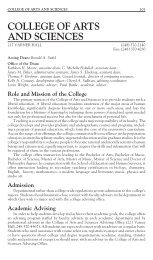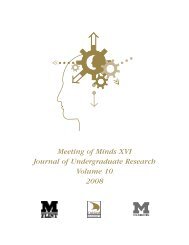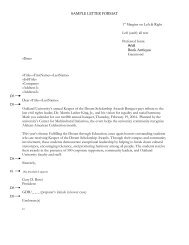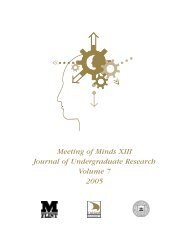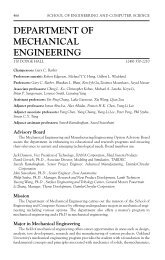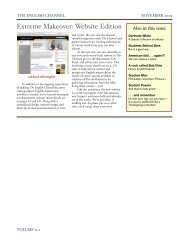MOM 2006 journal for pdf.pmd - University of Michigan-Flint
MOM 2006 journal for pdf.pmd - University of Michigan-Flint
MOM 2006 journal for pdf.pmd - University of Michigan-Flint
You also want an ePaper? Increase the reach of your titles
YUMPU automatically turns print PDFs into web optimized ePapers that Google loves.
eadily become Christians; it has seemed to me that they belong to no religion.” The incredible<br />
proximity <strong>of</strong> these details encourages the domination <strong>of</strong> a defenseless people <strong>for</strong> the sake <strong>of</strong><br />
religion.<br />
This seemingly self-contradicting concept was prevalent within Europe at the time. Such a<br />
conflict <strong>of</strong> values can be attributed to the transitory nature <strong>of</strong> these opposing principles. Todorov<br />
explains that “the Spanish conquistadors belong, historically, to that transitional period between a<br />
Middle Ages dominated by religion and a modern period that places material goods at the top <strong>of</strong><br />
its scale <strong>of</strong> values” (42). Thus, Spaniards mingled God with gold. Delno West points out the<br />
various aspects that played into popular culture including the legendary promise <strong>of</strong> “wealth and<br />
glory to the person who boldly sought the mysteries <strong>of</strong> lost biblical sites, fabled islands, and<br />
exotic peoples” which was further fueled by an “apocalyptic desire to extend the Christian empire<br />
to the farthest ends <strong>of</strong> the earth” (263, 266). In the messianic nature <strong>of</strong> his mission, Columbus<br />
was devoted to delivering Christianity to the Indies. However, Columbus’s concoction <strong>of</strong> religion<br />
and economic <strong>for</strong>esight surely invoked a rush <strong>of</strong> greed and adventure that could be civilly<br />
presented as a spiritual concern.<br />
As further exploration <strong>of</strong> the Americas augmented the possibility <strong>for</strong> obtaining wealth and<br />
power, the nature <strong>of</strong> political persuasion morphed. However, the unwavering religious element<br />
would maintain its status as a key player in the justification <strong>of</strong> conquest. Hernan Cortes, the<br />
conqueror <strong>of</strong> Mexico, masterfully implanted religious devices within his letters in order to<br />
manipulate Emperor Charles V. Be<strong>for</strong>e one can truly see Cortes’s attempt to control his reader<br />
with subtle spiritual psychology, it is imperative to understand his deceptive capabilities with<br />
regard to religion. Cortes directly relays to his ruler that the Aztecs believe the Spanish soldiers to<br />
be representatives <strong>of</strong> their long awaited god, Quetzalcoatl. He writes <strong>of</strong> his encounter with the<br />
Aztec leader, Moctezuma, “I responded to everything he said to me * , as I thought most fitting,<br />
especially in making him believe that Your Majesty was he whom they were expecting.” He then<br />
further explains the luxuries af<strong>for</strong>ded to him under this pretense.<br />
Historically, these actions play an integral role in his conquest <strong>of</strong> Mexico. The indigenous<br />
populations sought to identify the Spaniards with that which was culturally available. Todorov<br />
explains this adoption <strong>of</strong> the <strong>for</strong>eigner by arguing that: “Instead <strong>of</strong> perceiving this fact as a purely<br />
human if unprecedented encounter – the arrival <strong>of</strong> men greedy <strong>for</strong> gold and power – the Indians<br />
integrate it into a network <strong>of</strong> natural, social, and supernatural relations, in which the event<br />
thereby loses its singularity; it is somehow domesticated, absorbed into an order <strong>of</strong> already<br />
existing beliefs” (74). Upon observing this reaction, Cortes recognizes the power that such<br />
misperception confers, and further contributes to the obscurity <strong>of</strong> his origin. He even goes so far<br />
as to have his horses buried at night after a battle so to fuel the prevalent uncertainty <strong>of</strong> their<br />
mortality (Todorov 111). With the aid <strong>of</strong> Cortes’s inconspicuous persuasion, the Indians hesitate<br />
to defend themselves against <strong>for</strong>eign conquest and are thus preemptively defeated. His<br />
description <strong>of</strong> this stratagem proves that he is fully aware <strong>of</strong> his ability to mislead people through<br />
spiritual fallacy.<br />
* This is my translation.<br />
Meeting <strong>of</strong> Minds <strong>2006</strong> 110



